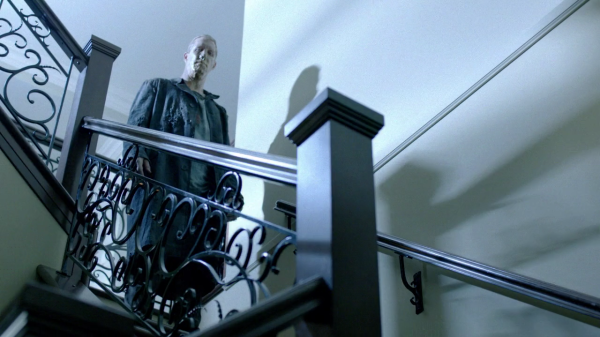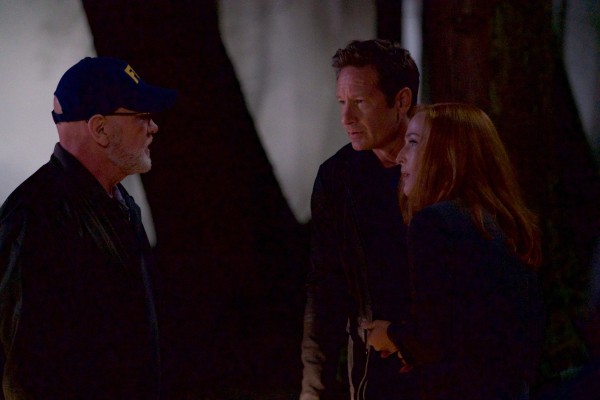MULDER: “How do you like that? The FBI finally found out what it’s like to be looked on as a little spooky!”
‘This’ doesn’t just feel like an episode of The X-Files. It feels as much like a core distillation of not just everything the show says today about the state of global surveillance, conspiracy and government, but rather everything it *used* to say. If ever an episode of the show was designed to remind us we’re no longer watching The X-Files of the 1990’s, it’s, yes, ‘This’.
The X-Files operates in an interesting place today. In my review of ‘My Struggle III’, part of the discussion revolved around how Chris Carter’s seminal series struggled when it was revived in 2016 precisely because it sat between what is now the world of yesterday (Obama’s stable, if divisive administration) and the world of today (Trump’s unstable, chaotic regime). Much like how all six episodes we’re figuring out how to re-conceptualise their storytelling for a new age of television, so Carter’s series attempted to find its place in a rapidly changing America. If the Season 11 premiere felt saddled by continuing mythology beats and was swamped by the narrative twist regarding Scully’s child, which had a mixed reception to say the least, then Glen Morgan’s follow up has the freedom to truly make the most of where The X-Files fits in the current paradigm.
Glen Morgan, and his oft-producing partner James Wong, were always two of the greatest assets The X-Files ever had. When they left firstly midway through the second season and later, following a brief return, midway through the fourth, there is no doubt both were missed. Morgan & Wong, as a duo, are responsible for some of the strongest episode the original series of The X-Files (as I’m now calling Seasons 1-9) ever produced – chiefly among them the peerless ‘One Breath’, which to some degree ‘This’ resembles. Not in story or even in style, but placed in terms of how it frames the characters of Mulder & Scully within a post-Watergate arena of paranoia, with mythological grandmasters operating at the head of the table. Though Morgan goes solo with ‘This’, everything he taps into feels like an extension and evolution of the kind of stories both were telling in the 90’s.

Morgan’s previous effort for Season 10, ‘Home Again’, tapped into a completely different angle he was always interested in – that of American monsters with a socio-political bent, be it the demon-worshipping high school teachers of ‘Die Hand Die Verletzt’ or the relics of a bygone, Civil War age in ‘Home’. With ‘This’, which essentially is as much a ‘mytharc’ tale as anything Carter has written over the last two seasons, just without the ‘A’ word (alien), Morgan feels free to tackle a conspiracy theory tale which very much pays homage to 1970’s thrillers such as Three Days of the Condor or The Parallax View. Indeed, in a wonderful in-joke perhaps only cinephiles may get, we learn the real name of legendary conspiracy informant ‘Deep Throat’ (himself based on Mark Felt, the Watergate informant, who used the same pseudonym), is ‘Ronald Pakula’. Who directed The Parallax View? Late, great director Alan J. Pakula. Morgan’s intentions are very clear.
The reference to ‘Deep Throat’ is a striking indication of the meta-textual nature of ‘This’, actually. Morgan’s episode is not just reference and re-imagining the 70’s conspiracy thriller, right down to moody car park meetings, shadowy government buildings and sinister, unnamed ‘government’ agents, but it’s re-imagining and reviving the very history of The X-Files as a show. Where the early seasons of the show were directly inspired by Watergate, 70’s paranoia and the succession of thrillers that followed, ‘This’ is as much inspired by The X-Files *itself*. The series doesn’t even need to reboot itself with a new, younger set of actors anymore – it can culturally digest its own sense of history *within* the narrative. So much of ‘This’ is about how much has changed around The X-Files, around production of the series, and Mulder remembering the halcyon days of ‘The Erlenmeyer Flask’ is a potent symbol of that. Things were much simpler then.
In many respects, they were. Mulder and indeed Skinner voice as much during ‘This’ – back when the show started, when Mulder & Scully partnered up, ‘the conspiracy’ was a shadowy cabal of guilty, Nazi-affiliated American men who came together exploiting the American Dream after World War Two to further their own private agenda. They became known as the Syndicate but when the Well-Manicured Man in ‘The Blessing Way’ described them as “a kind of consortium”, he was probably closer on the money. These men controlled everything. Now they’re long gone, and in their place? Dozens of overlapping interests. Private intelligence contractors made up of Russians operating on US soil, who can subsume the very jurisdiction and influence of the FBI. It couldn’t be more ironic if it tried, not least with the alleged Trump ties to Russia and, as Skinner puts it, how “the Bureau’s not in good standing with the White House, these days”.

The same echo of that comes from the newest grandmaster, the mysterious Erika Price, who works much better in that kind of position as she did in ‘My Struggle III’, effectively operating as a Monica Reyes-reflection. Price is still trying to operate as a Devil-figure for Mulder, tempting him into joining the side that has now formed against the obliquely mentioned Cigarette-Smoking Man, and she makes the point – chaos has replaced control, but there are no black and white absolutes with conspiracy as there were when Mulder got started. Much like security contracting or intelligence agencies, the world of conspirators is now a free for all, hers could be just one of many. Morgan therefore is reconceptualising exactly what ‘conspiracy’ means for an American culture where the President tweets about one against him every single day. The rules very much have changed.
This is the beauty of The X-Files now – it has so much real world meat to chew on, dramatically, allegorically and inter-texturally, and you can feel the pull of that in ‘This’. It also is increasingly unafraid to deal with the weight of its own, to some extent unresolved, history. ‘This’ calls back to numerous episodes from the original series in a way Season 10 seemed utterly afraid to do – the aforementioned ‘The Erlenmeyer Flask’, ‘Musings of a Cigarette-Smoking Man’ where we first heard Deep Throat referred to as ‘Ronald’ and which has now become canon, ‘Jump the Shark’, a terribly disliked episode which killed off fan-favourites The Lone Gunmen. Indeed, Morgan seems to suggest a slight level of uncertainty as to whether or not the Gunmen ever actually died, even beyond the key role of Richard Langly to the story of ‘This’. The X-Files is learning to be comfortable once again with its own history, while at the same time playing off it.
How else can we reconcile the pointed effort Morgan makes to explain what happened to the in-show X-Files themselves? This almost has become a question everyone forgot they wanted the answer to. At the end of Season 9 finale ‘The Truth’ (the series finale at the time), the X-Files disappeared after Mulder’s office was cleared out once he went on the run from the alien replicants in the US military. By the end of ‘My Struggle’, it seemed like business as usual back in the office, but why were the disappearance of the files never mentioned? Morgan makes it retroactively that the files were uploaded, scanned and processed so every intelligence agency after 9/11 were able to have classified access to Mulder’s work, and this makes a world of sense – given he had exposed all kinds of secret programs, unique individuals and strange technologies, wouldn’t a connected stream of pervasive, controlling government agencies want that information to digest?

Ironically, though it wouldn’t seem as much to Mulder, this is the ultimate vindication of all his years of work. These files aren’t just sitting in a basement room collecting dust, they are actively being explored and processed by a wide network of government agencies with overlapping, nebulous agendas. Scully in the previous episode suggested “the truth is still in the X-Files” and the intelligence community clearly feel the same way. It’s a neat parallel, indeed, to the paranormal aspect of the episode – the digital simulation which scans and uploads human consciousness to a world being exploited and mined for the express purpose of helping Price & Mr Y’s conspiracy to colonise space after, presumably, the Smoking Man’s intended extinction of the human race. As the X-Files have been scanned and processed, so are we, on a daily basis – Price even laughs at the fact tiny pieces of us can be scanned every time we use a cell phone. It’s the chilling extension of the fear cell phones can give you cancer – what if people are using it steal pieces of you for digital enslavement?
The X-Files also seems to be consistently re-purposing itself as much more of an action-friendly franchise. Even though ‘This’ is ostensibly a heightened, action version of the 70’s conspiracy thriller genre, this trend has been in place since ‘My Struggle II’ especially, in which Mulder had quite the smackdown with one of the Smoking Man’s heavies. ‘This’ has them firing guns, sliding under tables, and getting into numerous one-on-one combat situations. This may at first seem aberrant, given Mulder was never a fighter in the original series and Scully was always a scientist first, but if ‘This’ indicates Mulder & Scully are fighting a much more dangerous battle against forces innumerable (as the again compromised Skinner indicates), perhaps their more action-specific response is timely and, even beyond the changed realities of TV production, understandable.
Not quite every detail adds up or satisfies. Langly’s sudden beloved girlfriend of old feels like a plot ex machina (maybe he got the idea from Twilight Time in ‘Kill Switch’), Price letting Mulder see the simulation doesn’t make a whole lot of sense unless she actively wanted him to destroy it (or else she’s just a bit dim) and questions will be raised as to whether Skinner is being pushed a little too awkwardly back into the role of semi-antagonist than makes sense, given the years of history between he and our two leads, but these are minor concerns.
‘This’, outside of Darin Morgan’s delightful comedy in Season 10, is the most assured, interesting and exciting episode of The X-Files since the very early 2000’s, and if the remainder of what is almost certainly now the show’s last season punches at this level, we’re in for a heck of a final act.
Advertisements Share this:




